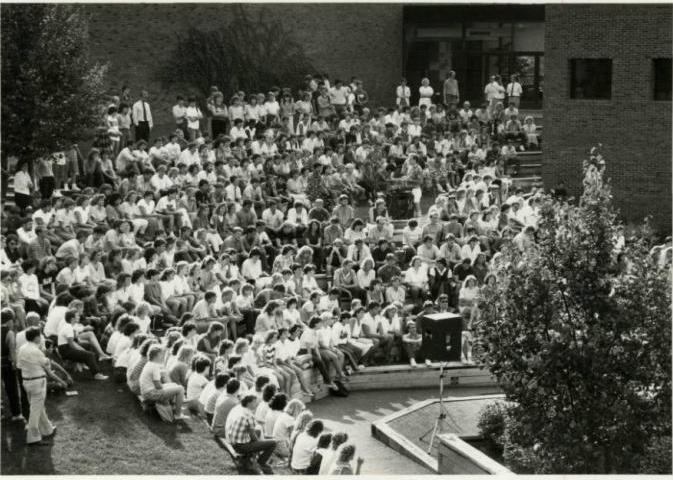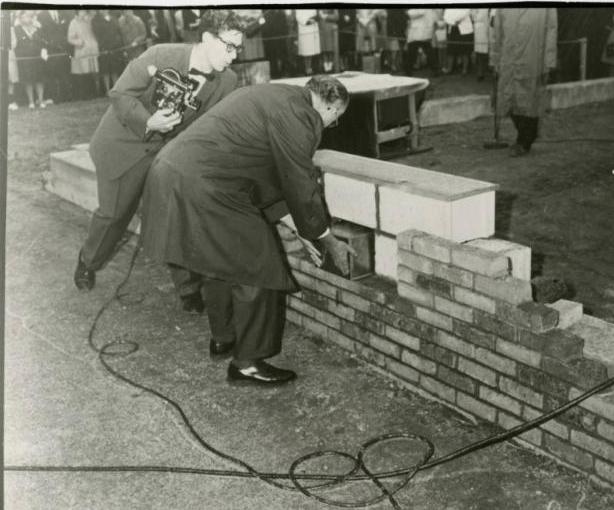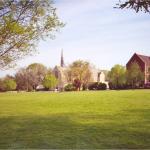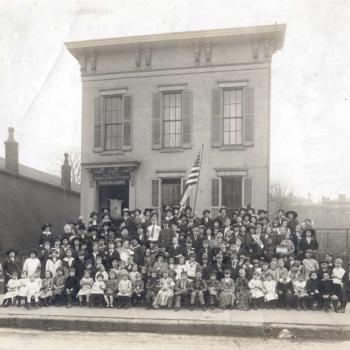Last fall I wrote a multi-part series inspired by the 150th anniversary of my employer, Bethel University. That year-long celebration culminates tonight with a gala at which I’ll be speaking again about our history, so I thought I’d extend the series by one more post — knowing that it asks a question that could be asked about any Christian college, church, or other organization:
After 150 years, what makes Bethel “Bethel”?
After all, the Minnesota-based university that will award hundreds of degrees this May looks little like the immigrant seminary that opened in the embers of the Chicago Fire, with a combined population of faculty and students you could count on one hand. The Minneapolis-born secondary school that gave Bethel its name has been gone for almost 90 years, and the St. Paul campus where Bethel College and Seminary settled in 1914 is now a federal job training center, with Bethel a half-century into its residency next to a lake in the suburbs. Attempts to spread our seminary to campuses on both coasts didn’t last long into the 21st century, yet arguably our reach is far greater because of technological innovations that were scarcely imaginable until the very end of the 20th century.
So what is the common thread? Historians are in their element observing change over time, but we also need to discern some continuity — un-change over time — if the past is to provide us with an enduring sense of identity in the present and future.

Bethel president George Brushaber had much the same question in mind in 1985, when he wrote his annual report to Bethel’s denomination, the Baptist General Conference. Brushaber would ultimately spend twenty-six years in that office, but three years into his term, that didn’t seem likely, thanks to a severe enrollment crisis caused by the Baby Bust. But he looked forward to 1985-1986 “with confidence and anticipation,” promising that Bethel would remain “Just the same as never before” — a phrase that he thought “[captured] Bethel’s dynamic nature and also its unshakeable commitment to its historic principles and purposes.”
It’s that relationship between “dynamic nature” and “unshakeable commitment,” I think, that gives us the most helpful way of thinking about change and continuity in institutional history.
First, the commitments that Brushaber defined as “unshakeable,” with a bit of my own commentary added:
1. Core religious beliefs
“Many colleges, struggling to survive in these difficult times,” began Brushaber, “have lost or given up their most basic beliefs and religious distinctives.” But even as he thought that enrollment challenges would tempt other church-related colleges to hasten the secularization that had been underway for decades, he insisted that Bethel would “find strength and hope in the Christian truths which have been foundational since the school was established in 1871.”
Here I’d just add two key clarifications, two religious distinctives that stem from Bethel’s unusual heritage: both Baptist and Pietist.
First, it’s not just that Bethel holds to “basic beliefs” or “Christian truths” that would be familiar to many Baptists, but that it insists on making such faith active in love of others. As I’ve argued before, for example, it’s not nearly enough for us to affirm a belief in the historic, bodily resurrection of Jesus; we need to live out that belief as people of hope — even when the fear of death — individual or institutional — tempts us to do otherwise.
Second, Bethel has historically done well to keep its list of foundational beliefs relatively short, focused on essential doctrines, while holding to an “irenic spirit” in matters on which faithful Christians can disagree — a commitment to peace, civility, and reconciliation that is too rarely found in conservative Baptist and other evangelical settings.

2. Academic excellence and intellectual breadth
Here I’ll change up Brushaber’s order in order underscore the importance of “academic excellence” to a president who was trained as a philosopher and helped found Christian Scholar’s Review. That excellence did not simply leave graduates “well-prepared” for their future careers; the act of learning itself served to “honor Christ.” Through “exciting teaching by caring professors,” Bethel students would “grow by grappling with all the difficult issues in the full range of God’s truth.”
I couldn’t possibly say it any better than Brushaber. Since we’re in the middle of a prolonged economic crisis nearly as bad as the one he faced, I’ll just acknowledge that it would be far easier if we could shake loose of such commitments — honor Christ with something less than excellence and prepare students with fewer or less committed faculty teaching much narrower fields of study — and cut our costs.
Far easier, but also far from what keeps Bethel “Bethel.”
3. Serving the church
Finally, Brushaber insisted that the Bethel of 1985 was “just the same” as the original Seminary of 1871 and all the iterations in between because it continued to prepare “men and women in all walks of life to be witnesses to the Gospel of Jesus Christ and the power of salvation through Him.” While fewer and fewer graduates entered pastoral ministry, we had still “sought to serve the church for more than a century.”
Whatever else has changed, Bethel has always helped students to hear their callings as followers of Jesus and to use their gifts to God’s glory and their neighbors’ good. And while I daresay we will never be as closely tied to a single denomination as we were in Bethel’s first century, I trust that we will continue to serve the wider church and further its mission.
But I’d add one other constant in our relationship with the church. As Brushaber’s even longer-serving predecessor, Carl Lundquist, put it, Bethel serves the church because it “raises disturbing questions, engages in rigid self-evaluation, expresses dissatisfaction with the status quo and seeks less popular but more consistently Christian solutions to the problems that vex mankind.”

Indeed, I think it’s that set of impulses that has helped Bethel to discern the difference between “unshakeable commitments” and those unsatisfactory aspects of the world as it is — and the church and Bethel as they are — that need to change.
At its best, that restless commitment to questioning, self-evaluation, and problem-solving helps us recognize and respond to what Brushaber called “the rapidly changing environment within which Bethel exists to carry out its mission.” For example, he argued that a college and seminary founded for the sake of “an immigrant minority” could no longer continue to privilege that culture, but should instead “reach out again to provide educational resources in new ways and to new groups” — like the “growing number of minority and multicultural churches” in Bethel’s denomination.
In that sense, Brushaber helped Bethel become the university that enrolls the children of Congolese, Ghanaian, Hmong, Karen, Mexican, and Salvadorian immigrants that I’ve had in class this year. But I’m even more struck by his insight that Bethel’s “dynamic nature” was not simply dictated by the need to respond to changing context, but by institutional commitments to “continuous self-examination and renewal” and the faculty’s inherent need for “personal growth and discovery.”
What I don’t think he quite articulated was that those impulses, too, arise from our distinctive religious heritage. Being Baptist may give Bethel its core set of beliefs, but being Pietist should make us expect new birth and new life, conversion and transformation, renewal and revival — as individuals and as a community.
If so, then I don’t think I’m being unduly optimistic to expect that the Bethel of the next 150 years will continue to stay “just the same as never before.”
Thanks to my colleague Jennifer Koenig Nelson for inviting me to address our adult undergraduate, graduate, and seminary faculty last week; that talk inspired this post.













